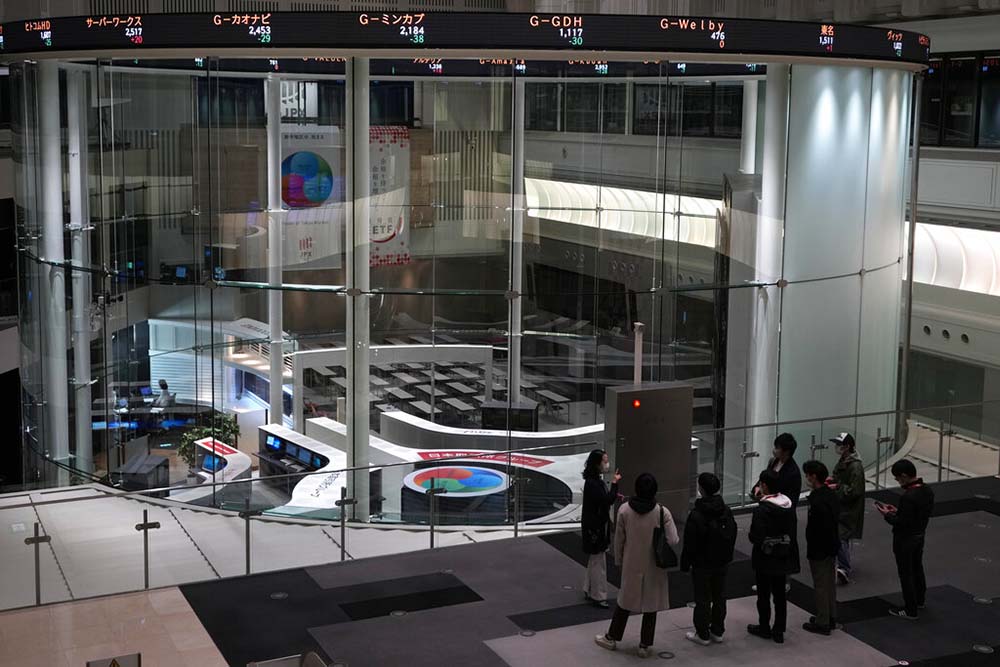
BANGKOK: Shares rose Monday in Asia in thin post-Christmas holiday trading, with markets in Hong Kong, Sydney and several other places closed.
Tokyo's Nikkei 225 index gained 0.5% to 26,367.40 and the Kospi in Seoul added 0.2% to 2,317.48. The Shanghai Composite index surged 0.7% to 3,067.54 and the SET in Bangkok added 0.3%.
Traders were awaiting a speech by the governor of Japan's central bank Monday for hints into whether the Bank of Japan might further adjust its longstanding ultra-lax monetary policy to cope with pressures from inflation.
Last week, markets were jolted by a slight adjustment in the target range for the yield of long-term Japanese government bonds, viewing it as a sign the Bank of Japan might finally unwind its massive support for the economy through ultra-low interest rates and purchases of bonds and other assets.
A widening gap between interest rates in Japan and other countries has pulled the Japanese yen sharply lower against the US dollar and other currencies and accentuated the impact of higher costs for many imported products and commodities.
But the BOJ has kept its key lending rate at minus 0.1%, cautious over risks of recession.
On Friday, the S&P 500 reversed a 0.7% loss to close 0.6% higher, at 3,844.82. With one week left of trading in 2022, the benchmark index is down 19.3% for the year.
The Dow Jones Industrial Average rose 0.5% to 33,203.93, while the tech-heavy Nasdaq edged 0.2% higher, to 10,497.86.
Small company stocks also rose. The Russell 2000 index picked up 0.4% to 1,760.93.
Mixed economic news weighed on stocks early on, but the indexes rebounded by late afternoon amid relatively light trading ahead of the long holiday weekend. The US and European markets will be closed Monday.
Markets are in a tricky situation where relatively solid consumer spending and a strong employment market reduce the risk of a recession but also raise the threat of higher interest rates from the Federal Reserve as it presses its campaign to crush inflation.
The government reported Friday that a key measure of inflation is continuing to slow, though it's still far higher than anyone wants to see. The Federal Reserve monitors the inflation gauge in the consumer spending report, called the personal consumption expenditures price index, even more closely than it does the government's better-known consumer price index.
Also, growth in consumer spending weakened last month by more than expected, but incomes were a bit stronger than expected.
A separate report from the University of Michigan indicating US households are lowering their forecasts for upcoming inflation. That could help avoid a scenario the Federal Reserve has said often it's desperate to prevent: a vicious cycle where shoppers rush to make purchases in advance of expected price rises, which would only worsen inflation.
The latest round of reports were the last big US economic updates of the year. Investors will soon turn their focus to the next round of corporate earnings.
The Fed has said it will keep raising interest rates to tame inflation, even though the pace of price increases has continued to ease. The Fed's key overnight rate is at its highest level in 15 years, after beginning the year at a record low of roughly zero. The key lending rate, the federal funds rate, stands at a range of 4.25% to 4.5%, and Fed policymakers have forecast that the rate will reach a range of 5% to 5.25% by the end of 2023.
Given the persistence of high inflation, "many are starting to believe the main story is that there will be no scope for Fed cuts in the year ahead and that central banks will maintain these relatively high rates until underlying inflation is truly cracked — and that process will take time," Stephen Innes of SPI Asset Management said in a commentary.
The Fed's forecast doesn't call for a rate cut before 2024, and the higher rates have raised concerns the economy could stall and slip into a recession in 2023. High rates have also been weighing heavily on prices for stocks and other investments.
In currency dealings, the US dollar slipped to 132.53 Japanese yen from 132.82 yen late Friday. The euro rose to $1.0628 from $1.0614.
By RSS/AP
READ ALSO:
Published Date: December 26, 2022, 12:00 am
Post Comment
E-Magazine
RELATED International





